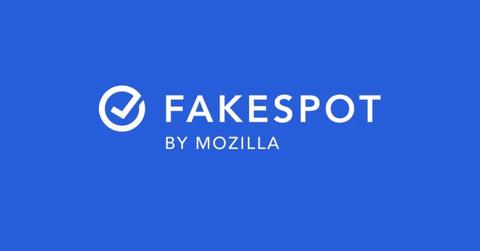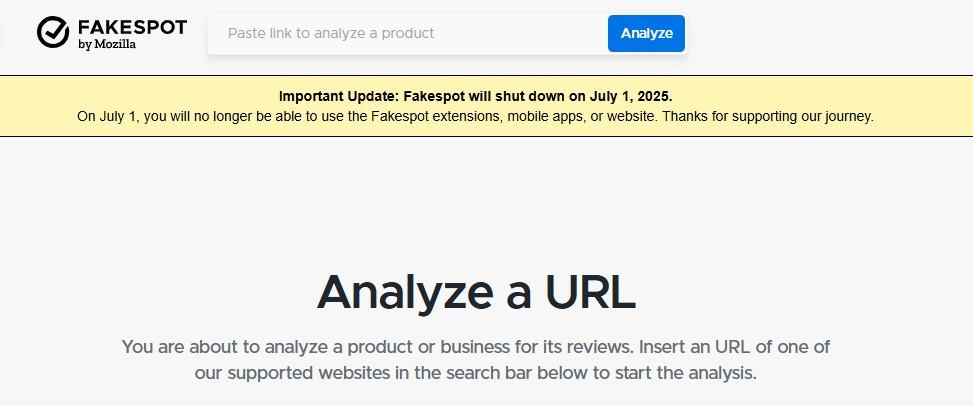Why Is Fakespot Shutting Down? Mozilla Refocuses as Users Scramble for Alternatives
Mozilla bought Fakespot back in 2023, so why has the company decided to shut it down?
Published May 23 2025, 3:16 p.m. ET

If you’ve ever added something to your Amazon cart and paused — wondering whether the five-star reviews were too good to be true — you aren’t the only one. Unfortunately, fake reviews are a huge problem when it comes to online shopping. That, however, is where tools like Fakespot became extremely useful.
For online shoppers, Fakespot has been a go-to tool for spotting fake product reviews. Sadly, this tool is going away. Per Mozilla’s blog, Fakespot is officially shutting down on July 1, 2025.
Why is Fakespot shutting down? What does it mean for people who have counted on it for online shopping? The short version: Mozilla, the company that owns Fakespot, is changing its course. The longer version? Keep reading and we’ll try to explain.

Why is Fakespot shutting down? Mozilla says it is a strategic shift.
Mozilla says it’s all part of a broader plan to refocus on Firefox. In a recent update on Mozilla’s blog, the company explained that some of its recent acquisitions — including Fakespot and Pocket — “didn’t fit a model we could sustain.” Instead, Mozilla is shifting its energy toward Firefox features, including AI tools and vertical tabs.
As reported by The Verge, this isn’t just a product shutdown — it’s a reset. Mozilla is doubling down on its flagship browser. That means saying goodbye to side projects, even ones like Fakespot that filled a real need. Unfortunately, this put other tools like Pocket on the chopping block as well.
People relied on Fakespot, not just for convenience — but for trust.
Here’s the thing: Fakespot wasn’t just about convenience. For a lot of users, it was about trust. The extension analyzed review patterns and gave products a grade — helpful if you didn’t want to scroll through hundreds of questionable ratings. More than that, it came from Mozilla, a company people associate with privacy and transparency.
One Reddit user said it best: “Why I valued Fakespot so much was because the extension is in a rather privileged position with respect to your personal privacy … the fact that it came from Mozilla (an [organization] that I trust) meant a lot to me.”
If you’ve ever hesitated to install a browser extension because you didn’t want it tracking your shopping habits, you get it. Tools like this are rare. So, Mozilla pulling the plug has some folks wondering what’s left that they can trust.
Not everyone is mourning the loss of Fakespot.
Of course, not everyone thought Fakespot was perfect. In fact, some people are kind of shrugging this one off. “Fakespot was never really good in the first place,” one Reddit user said. “Sometimes things got an A or B rating when it didn’t make sense at all.”
Others chimed in to agree they weren’t wrong. Fakespot’s algorithm wasn’t flawless. Plenty of users noticed weird ratings that didn’t quite line up with the reviews they were seeing. For some, it felt just as easy to skim a product page and spot the fake reviews themselves.
Still, the bigger picture is leaving people uneasy.
Here’s where things get tricky. Mozilla has been making a lot of cuts lately. First with Pocket and now with Fakespot. So, users are starting to ask: If Mozilla bought these tools just to shut them down, what’s the long game here?
One Redditor asked bluntly: “Why did Mozilla buy Pocket and Fakespot if they were only going to shut them down within a few years? Has it even been a few years?” It’s a fair point — and it’s made some long-term supporters feel like Mozilla is losing its way.
At the heart of it all the deeper concern is that people don’t just want clever tools. They want tools they can trust. When a company like Mozilla — known for standing up for users — starts walking away from privacy-first projects, it rattles people.
If you’re looking for a Fakespot replacement, you're not alone. Unfortunately, most of the alternatives out there don’t come with Mozilla’s privacy-first reputation. Furthermore, as some users pointed out, many review-checking tools are built on data mining business models.
For now, you might have to rely on your own instincts. Scroll the listing. Look for generic phrases. Check the reviewer’s profile. It’s not as convenient — but it’s better than nothing.